By Jerry Liu
When I heard about this Chinese movie, Study Abroad, I was in Los Angeles hustling as an artist. Growing up as an American-born Chinese (ABC), Hollywood never seemed like a very friendly place for an Asian American face like me. Whether in a TV show or in a movie, Asian American males always got the short end of the stick and often portrayed the comedic roles, the science nerds, or the mystical masters(like Kung Fu fighters). When I decided that I wanted to be a filmmaker, I wanted to help change that disparity in the portrayal of Asian American males. My Hollywood journey definitely filled with missteps and uncertainty, but during the spring of 2015, I was interning part-time at a very famous production company and was making a little bit of money through freelance work. Most importantly, I was learning and getting better as an artist. Just as I ended my internship, my parents broke the news to me that there was a Chinese movie in pre-production in the DC area, where I grew up and they still lived. Most importantly, it was going to utilize all local actors. My parents, my mom especially, urged me to come back to the East Coast to take advantage of the opportunity.
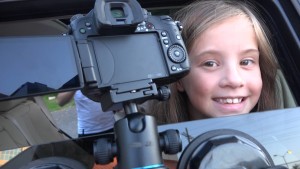 At first, I was hesitant. For me, Hollywood was and is the only place to make a quality career in entertainment. However, after reading more about the project and learning more about the director Auguste, I decided to take a chance. Auguste seemed like a genuinely good guy who was very passionate about his craft. With all this in mind, I bought my ticket back to DC and paid the penalty fees (more than $600) to end my lease early in Culver City, LA. I wanted to be part of this movie and play any character available. Acting had always been something that I did on the side, but I always wanted to do more of it, and this was an opportunity to get more serious about the craft. I had sent Auguste’s assistant Lewis samples of my work on YouTube, and Auguste seemed to really enjoy my brand of humor. It felt as if I was finally going to be in a place where I’d be completely accepted.
At first, I was hesitant. For me, Hollywood was and is the only place to make a quality career in entertainment. However, after reading more about the project and learning more about the director Auguste, I decided to take a chance. Auguste seemed like a genuinely good guy who was very passionate about his craft. With all this in mind, I bought my ticket back to DC and paid the penalty fees (more than $600) to end my lease early in Culver City, LA. I wanted to be part of this movie and play any character available. Acting had always been something that I did on the side, but I always wanted to do more of it, and this was an opportunity to get more serious about the craft. I had sent Auguste’s assistant Lewis samples of my work on YouTube, and Auguste seemed to really enjoy my brand of humor. It felt as if I was finally going to be in a place where I’d be completely accepted.
Once I got back to the DC area and met the team, the production realized that with my experience in LA, I could help them with many areas of production besides the acting. For me, anything is a learning experience, so I decided to give them my time and help out the casting director, Ethan. I soon devoted a lot of time to casting. Also, none of the team spoke English, so I quickly became the unofficial translator, both with the cast and crew and with the script and directing. Then, the production told me that they wanted my help finding them a gaffer (a complicated word for lighting person) and sound mixer. I had volunteered for many film festivals in DC in 2012, so I knew a lot of artists in the DC area. “That should be easy,” I thought. I had a reason to reconnect with everyone in the DC area too. So for the first few weeks, those were two of my primary tasks.
The other big task during pre-production was to get all the gear in place. Because the cinematographer came from China, he wasn’t able to bring all his gear. Therefore, we spent many hours on different online stores buying gear, all paid for by the director’s credit card. Auguste’s financial investment reminded me of Justin Lin’s story when he directed Better Luck Tomorrow. Lin maxed out so many cards to make the movie that he wanted to make. It looked like Auguste might do the same. Any artist who puts himself completely at financial risk gets my respect.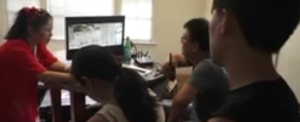
One of biggest differences that I immediately noticed with this Chinese production is the way they screen actors. In any American movie, the actors have to audition. The audition could be a reading of lines, the viewing of a monologue, or some other way of communicating acting prowess. However, Auguste had a different philosophy. To him, any person could be molded into an actor, and he honestly preferred working with people who didn’t have that much training because he felt that they were able to be more genuine if given the right directing. So the Chinese team didn’t “audition” the actors in the American way. Their way of audition involved simply meeting with the actors, talking to them, and making sure that the person’s look and personality fit. For me, one of the earliest cultural bridges that I had to make was to communicate to the non-Chinese actors that they didn’t need to do as much prior preparation. Many of the American actors were contacting me asking for the script, offering to send me resumes, headshots and monologues, but what the director really wanted was to meet the actor and talk.
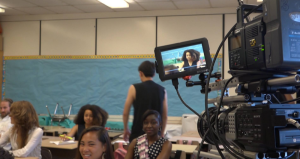 When I started helping find the gaffer and the sound recording artist, I experienced another difference in culture. The Chinese team had a set budget for the lighting and sound, and they weren’t willing at all to budge. There’s an old expression that Chinese people will always find the best deal and never give you a deal back, and this was definitely the case. I went through all my contacts in the DC area and went on social media to find more people who could do a professional job, but every single American person who expressed interest in the project had an asking rate that was too high for the Chinese team. “How is this going to solve itself?” I kept wondering.
When I started helping find the gaffer and the sound recording artist, I experienced another difference in culture. The Chinese team had a set budget for the lighting and sound, and they weren’t willing at all to budge. There’s an old expression that Chinese people will always find the best deal and never give you a deal back, and this was definitely the case. I went through all my contacts in the DC area and went on social media to find more people who could do a professional job, but every single American person who expressed interest in the project had an asking rate that was too high for the Chinese team. “How is this going to solve itself?” I kept wondering.
But before I could really think more about this, the Chinese team found a gaffer and a sound person from LA, in fact, a whole team from LA. The crew that they found was going to drive over with all their professional gear. Imagine my surprise when I heard the news that the Chinese team successfully found a very professional crew, probably even more professional than the people that I was contacting. I was impressed; maybe more than just impressed. All the other local artists that I had contacted for the potential gig thought the same after I broke the news to them. They were very impressed at the legendary Chinese ability to get a deal. “Now that the crew’s ready, time to get cracking,” I remember excitedly thinking to myself.
So production has been going on since July. One of the biggest difference between how this director works and how other directors work is that Auguste relies on his own spontaneous artistic feeling 100% of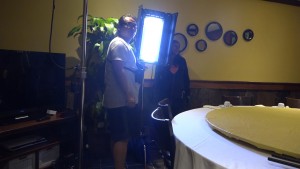 the time. This goes with what scenes to film, what angles to use, how to make the actors improv, what to wear, etc. Auguste decides all of this on the spot. It is quite impressive that his mind is able to do this and that he can maintain the big picture of the movie while this happens; however, it makes it a little hard on everyone else involved. Since the actors don’t know what time their scenes will film, they often arrive way before they are needed and stay way later just in case the director needs anything. The cinematographer and his camera and lighting crew have to consistently rearrange lights and camera to follow the director’s spontaneous shifts in scenes. Whereas a more American production would film all the scenes that need that lighting set-up first and then change the lights and film every scene that uses the next lighting setup, Auguste will change the lights immediately after a scene because he wants to move to the next scene that he feels. In addition, nobody knows what Auguste will spontaneously feel the next day, so the Assistant Director and anyone else involved in scheduling is at a constant roadblock because they cannot provide actors with an advanced schedule. Sometimes, they have to let actors know only a few hours before the call-time. And since I’m one of the few fluent English-speakers, I often have to be the one to pass along the information at weird hours of the night. I even got frustrated by all this and had to have a very direct talk with the director about scheduling and organization and how America works. Challenging the director is something never heard of in the Chinese culture either, so that incident will forever be ingrained in the Chinese team’s heads, for better or for worse.
the time. This goes with what scenes to film, what angles to use, how to make the actors improv, what to wear, etc. Auguste decides all of this on the spot. It is quite impressive that his mind is able to do this and that he can maintain the big picture of the movie while this happens; however, it makes it a little hard on everyone else involved. Since the actors don’t know what time their scenes will film, they often arrive way before they are needed and stay way later just in case the director needs anything. The cinematographer and his camera and lighting crew have to consistently rearrange lights and camera to follow the director’s spontaneous shifts in scenes. Whereas a more American production would film all the scenes that need that lighting set-up first and then change the lights and film every scene that uses the next lighting setup, Auguste will change the lights immediately after a scene because he wants to move to the next scene that he feels. In addition, nobody knows what Auguste will spontaneously feel the next day, so the Assistant Director and anyone else involved in scheduling is at a constant roadblock because they cannot provide actors with an advanced schedule. Sometimes, they have to let actors know only a few hours before the call-time. And since I’m one of the few fluent English-speakers, I often have to be the one to pass along the information at weird hours of the night. I even got frustrated by all this and had to have a very direct talk with the director about scheduling and organization and how America works. Challenging the director is something never heard of in the Chinese culture either, so that incident will forever be ingrained in the Chinese team’s heads, for better or for worse.
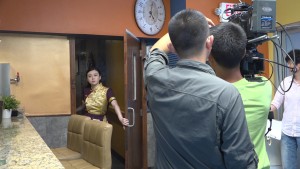 Working on this project has been a learning experience for everyone involved. For anyone with Western culture in his or her system like me (or most of the cast and crew), it’s been a great experience learning how to adapt on the spot. Our Western system emphasizes organization and efficiency over everything else, and our minds get jittery when faced with any aberration. For me, I’ve learned to find other productive tasks to do during the down time. With script and acting, I’ve learned to get the general idea and be open to reinterpretation and ad-libing any moment. That’s what I also tell all the American actors when I give them the translated script that I wrote. “Make sure to make it your own,” I repeatedly emphasize. Being fluid is a good skill not just for acting but also for life because life never goes down a straight path anyways. I also do my best to emphasize to the Chinese team that it’s best to at least try to stick to a schedule or a plan. And to the Chinese team’s credit, they’ve been very slowly learning how to respect people’s times. The wording of my previous sentence shows how much Western culture I have in me. Go to any Asian country from China southward, and you’ll see that people’s sense of time is just loose. For example, if someone in China tells you that they’ll be at your house in a minute, they’ll probably come in an hour if they’re lucky. For someone like Auguste who has been making movies for 20 years in China, he’s used to that system. Add to this that China has fewer labor laws and multitudes more people who want to be actors, productions in China will feel empowered to ask for commitment that Americans will never accept. Valuing time is what America does, and the director Auguste and friends have gotten a crash-course in this essential Western quality. If you tell someone in America at midnight that they’re needed for a scene the next day, it’s very likely that they may have something already planned and cannot easily shift their schedule. Many of the actors have also been very, very understanding and make certain days completely free just in case. However, most people, especially people who are not hardcore artists, have a life beyond the movie, and to survive in this world, most people work a full-time job and have a family and hobbies on the side. This seemingly common-sense idea is not always easily communicated to people who have grown up in the entertainment industry in China. In fact, it might take some more time for this Chinese team to truly grasp that Americans value their personal time and schedule.
Working on this project has been a learning experience for everyone involved. For anyone with Western culture in his or her system like me (or most of the cast and crew), it’s been a great experience learning how to adapt on the spot. Our Western system emphasizes organization and efficiency over everything else, and our minds get jittery when faced with any aberration. For me, I’ve learned to find other productive tasks to do during the down time. With script and acting, I’ve learned to get the general idea and be open to reinterpretation and ad-libing any moment. That’s what I also tell all the American actors when I give them the translated script that I wrote. “Make sure to make it your own,” I repeatedly emphasize. Being fluid is a good skill not just for acting but also for life because life never goes down a straight path anyways. I also do my best to emphasize to the Chinese team that it’s best to at least try to stick to a schedule or a plan. And to the Chinese team’s credit, they’ve been very slowly learning how to respect people’s times. The wording of my previous sentence shows how much Western culture I have in me. Go to any Asian country from China southward, and you’ll see that people’s sense of time is just loose. For example, if someone in China tells you that they’ll be at your house in a minute, they’ll probably come in an hour if they’re lucky. For someone like Auguste who has been making movies for 20 years in China, he’s used to that system. Add to this that China has fewer labor laws and multitudes more people who want to be actors, productions in China will feel empowered to ask for commitment that Americans will never accept. Valuing time is what America does, and the director Auguste and friends have gotten a crash-course in this essential Western quality. If you tell someone in America at midnight that they’re needed for a scene the next day, it’s very likely that they may have something already planned and cannot easily shift their schedule. Many of the actors have also been very, very understanding and make certain days completely free just in case. However, most people, especially people who are not hardcore artists, have a life beyond the movie, and to survive in this world, most people work a full-time job and have a family and hobbies on the side. This seemingly common-sense idea is not always easily communicated to people who have grown up in the entertainment industry in China. In fact, it might take some more time for this Chinese team to truly grasp that Americans value their personal time and schedule.
As I’m writing this, the movie’s close to wrapping (a technical term for finishing up the filming part). It’s moving along with trials and tribulations like any big project, but it also has its unique challenges that 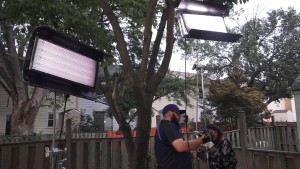 relate to cultural interaction. The beauty of this movie is that it wants to tell an authentic story about cultural interaction and seeks to show the beauty of Chinese and American culture. Well, the making of the movie already illustrates all of this.
relate to cultural interaction. The beauty of this movie is that it wants to tell an authentic story about cultural interaction and seeks to show the beauty of Chinese and American culture. Well, the making of the movie already illustrates all of this.
The movie’s plot centers around a Chinese graduate student who comes to America to study Engineering. After coming to America and experiencing freedom and opportunity, she learns that she could do whatever she wants and whatever makes her happy. She switches her career and starts a non-profit, a Chinese Cultural Center. Much like the protagonist in our story, all the dedicated people behind the movie started out thinking one way but will learn through trials and tribulations to think on a more elevated platform. If not, then we’ll at least have some good stories to tell our kids in the future 🙂


